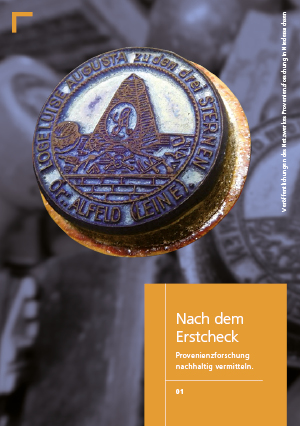How to Cite
License (Chapter)

This work is licensed under a Creative Commons Attribution-ShareAlike 4.0 International License.
Identifiers (Book)
Published
Impulse: Schwierige Dinge – ein Stadtlabor über Raubgut in Privathaushalten
The city laboratory is an institution of the Historisches Museum Frankfurt creating events and exhibitions together with citizens of Frankfurt. One of the projects within this framework was “Schwierige Dinge” (Problematic things) in 2018 which focused on Nazi loot in private property. Four Frankfurt museums were cooperating: the Historisches Museum (Historical Museum), the Museum Angewandte Kunst (Museum Applied Arts), the Weltkulturen Museum (World Cultures Museum) and the Jewish Museum. The assumption of a “collective amnesia” concerning Nazi loot in private property formed the basis of the project. In the beginning, appeals for informing the participating institutions about such objects were transported via local Frankfurt media. The resonance was limited. Most of the nine participants had earlier contacts with the city laboratory. During various workshops the partici-pants investigated the provenance of their objects assisted by experts, including talks about personal fears and worries connected to the objects as well as their presentation within an exhibition. The whole process was documented by interviews and drawings which were also shown in the exhibition. The project led to an investigation into the concerned family’s history and aroused the wish for a permanent consultation service. Such a service could effectively be provided by smaller, locally established museums because it became apparent that projects of this kind are depending on an established relationship based on trust. Thus, museums could actively take part in creating an inclusive culture of remembrance.







